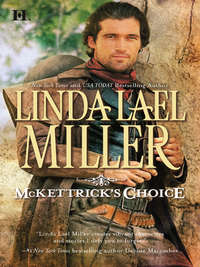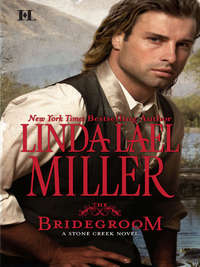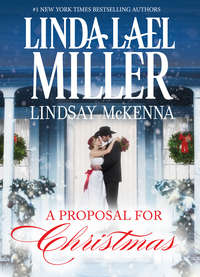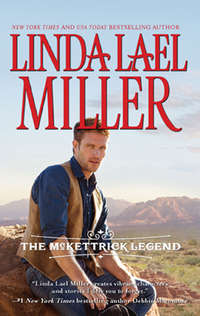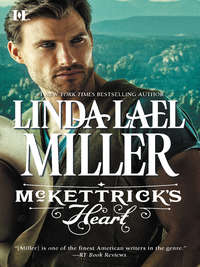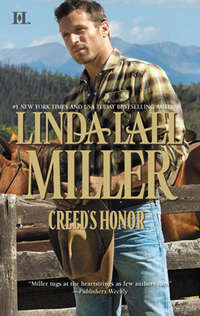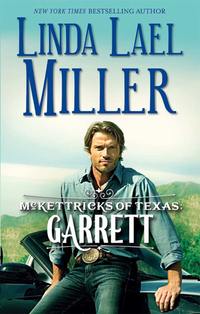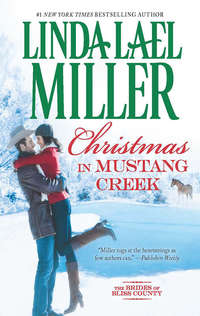
Полная версия
Here and Then
The marshal glanced at her hand, but failed to offer his own. “You make a habit of prowling around in other people’s houses?” he asked. His marvelous eyes widened as he took in her jeans, T-shirt and sneakers.
“I’m looking for my cousin Elisabeth.” Rue’s smile was a rigid curve, and she clung to it like someone dangling over the edge of a steep cliff. “I have reason to believe she might be in…these here parts.”
The lawman set his rifle carefully against the wall, and Rue gulped. His expression was dubious. “Who are you?” he demanded again, folding his powerful arms. Afternoon sunlight streamed in through the open door to nowhere, and Rue could smell charred wood.
“I told you, my name is Rue Claridge, and I’m looking for my cousin, Elisabeth McCartney.” Rue held up one hand to indicate a height comparable to her own. “She’s a very pretty blonde, with big, bluish green eyes and a gentle manner.”
The marshal’s eyebrows drew together. “Lizzie?”
Rue shrugged. She’d never known Elisabeth to call herself Lizzie, but then, she hadn’t visited another century, either. “She wrote me that she was in love with a man named Jonathan Fortner.”
At this, the peace officer smiled, and his craggy face was transformed. Rue felt a modicum of comfort for the first time since she’d stepped over the threshold. “They’re gone to San Francisco, Jon and Lizzie are,” he said. “Got married a few months back, right after her trial was over.”
Rue took a step closer to the marshal, one eyebrow raised, the peculiarities and implications of her situation temporarily forgotten. “Trial?”
“It’s a long story.” The splendid eyes swept over her clothes again and narrowed once more. “Where the devil did you get those duds?”
Rue drew in a deep breath and expelled it, making tendrils of her hair float for a few moments. “I come from another—place. What’s your name, anyhow?”
“Farley Haynes,” the cowboy answered.
Privately, Rue thought it was the dumbest handle she’d ever heard, but she was in no position to rile the man. “Well, Mr. Haynes,” she said brightly, “I am sorry that you had to come all the way out here for nothing. The thing is, I know Elisabeth—Lizzie—would want me to stay right here in this house.”
Haynes plunked his battered old hat back onto his head and regarded Rue from under the brim. “She never mentioned a cousin,” he said. “Maybe you’d better come to town with me and answer a few more questions.”
Rue’s first impulse was to dig in her heels, but she was an inveterate journalist, and despite the fact that her head was still spinning from the shock of sudden transport from one time to another, she was fiercely curious about this place.
“What year is this, anyway?” she asked, not realizing how odd the question sounded until it was already out of her mouth.
The lawman’s right hand cupped her elbow lightly as he ushered Rue down the front stairs. In his left, he carried the rifle with unnerving expertise. “It’s 1892,” he answered, giving her a sidelong look, probably wondering if he should slap the cuffs on her wrists. “The month is October.”
“I suppose you’re wondering why I didn’t know that.” Rue chatted on as the marshal escorted her out through the front door. There was a big sorrel gelding waiting beyond the whitewashed gate. “The fact is, I’ve—I’ve had a fever.”
“You look healthy enough to me,” Haynes responded, and just the timbre of his voice set some chord to vibrating deep inside Rue. He opened the gate and nodded for her to go through it ahead of him.
She took comfort from the presence of the horse; she’d always loved the animals, and some of the happiest times of her life had been spent in the saddle at Ribbon Creek. “Hello, big fella,” she said, patting the gelding’s sweaty neck.
In the next instant, Rue was grabbed around the waist and hoisted up into the saddle. Before she could react in any way, Marshal Haynes had thrust his rifle into the leather scabbard, stuck one booted foot in the stirrup and swung up behind her.
Rue felt seismic repercussions move up her spine in response.
“Am I under arrest?” she asked. He reached around her to grasp the reins, and again Rue was disturbed by the powerful contraction within her. Cowboy fantasies were one thing, she reminded herself, but this was a trip into the Twilight Zone, and she had an awful feeling her ticket was stamped “one-way.” She’d never been on an assignment where it was more important to keep her wits about her.
“That depends,” the marshal said, the words rumbling against her nape, “on whether or not you can explain how you came to be wearing Mrs. Fortner’s necklace.”
Leather creaked as Rue turned to look up into that rugged face, her mind racing in search of an explanation. “My—our aunt gave us each a necklace like this,” she lied, her fingers straying to the filigree pendant. The piece was definitely an original, with a history. “Elis—Lizzie’s probably wearing hers.”
Farley looked skeptical to say the least, but he let the topic drop for the moment. “I don’t mind telling you,” he said, “that the Presbyterians are going to be riled up some when they get a gander at those clothes of yours. It isn’t proper for a lady to wear trousers.”
Rue might have been amused by his remarks if it hadn’t been for the panic that was rising inside her. Nothing in her fairly wide experience had prepared her for being thrust unceremoniously into 1892, after all. “I don’t have anything else to wear,” she said in an uncharacteristically small voice, and then she sank her teeth into her lower lip, gripped the pommel of Marshal Haynes’s saddle in both hands and held on for dear life, even though she was an experienced rider.
After a bumpy, dusty trip over the unpaved country road that led to town—its counterpart in Rue’s time was paved—they reached Pine River. The place had gone into rewind while she wasn’t looking. There were saloons with swinging doors, and a big saw in the lumber mill beside the river screamed and flung sawdust into the air. People walked along board sidewalks and rode in buggies and wagons. Rue couldn’t help gaping at them.
Marshal Haynes lifted her down from the horse before she had a chance to tell him she didn’t need his help, and he gave her an almost imperceptible push toward the sidewalk. Bronze script on the window of the nearest building proclaimed, Pine River Jailhouse. Farley Haynes, Marshal.
Bravely, Rue resigned herself to the possibility of a stretch behind bars. Much as she wanted to see the twentieth century again, she’d changed her mind about leaving 1892 right away—she meant to stick around until Elisabeth came back. Despite those glowing letters, Rue wanted to know her cousin was all right before she put this parallel universe—or whatever it was—behind her.
“Do you believe in ghosts, Farley?” she asked companionably, once they were inside and the marshal had opened a little gate in the railing that separated his desk and cabinet and wood stove from the single jail cell.
“No, ma’am,” he answered with a sigh, hanging his disreputable hat on a hook by the door and laying his rifle down on the cluttered surface of the desk. Once again, his gaze passed over her clothes, troubled and quick. “But I do believe there are some strange things going on in this world that wouldn’t be too easy to explain.”
Rue tucked her hands into the hip pockets of her jeans and looked at the wanted posters on the wall behind Farley’s desk. They should have been yellow and cracked with age, but instead they were new and only slightly crumpled. A collection of archaic rifles filled a gun cabinet, their nickel barrels and wooden stocks gleaming with a high shine that belied their age.
“You won’t get an argument from me,” Rue finally replied.
Chapter Two
Rue took in the crude jail cell, the potbellied stove with a coffeepot and a kettle crowding the top, the black, iron key ring hanging on a peg behind the desk. Her gaze swung to the marshal’s face, and she gestured toward the barred room at the back of the building.
“If I’m under arrest, Marshal,” she said matter-of-factly, “I’d like to know exactly what I’m being charged with.”
The peace officer sighed, hanging his ancient canvas coat from a tarnished brass rack. “Well, miss, we could start with trespassing.” He gestured toward a chair pushed back against the short railing that surrounded the immediate office area. “Sit down and tell me who you are and what you were doing snooping around Dr. Fortner’s house that way.”
Rue was feeling a little weak, a rare occurrence for her. She pulled the chair closer to the desk and sat, pushing her tousled hair back from her face. “I told you. My name is Rue Claridge,” she replied patiently. “Dr. Fortner’s wife is my cousin, and I was looking for her. That’s all.”
The turquoise gaze, sharp with intelligence, rested on the gold pendant at the base of Rue’s throat, causing the pulse beneath to make a strange, sudden leap. “I believe you said Mrs. Fortner has a necklace just like that one.”
Rue swallowed. She was very good at sidestepping issues she didn’t want to discuss, but when it came to telling an outright lie, she hadn’t even attained amateur status. “Y-yes,” she managed to say. Her earlier shock at finding herself in another century was thawing now, becoming low-grade panic. Was it possible that she’d stumbled into Elisabeth’s nervous breakdown, or was she having a separate one, all her own?
The marshal’s jawline tightened under a shadow of beard. His strong, sun-browned fingers were interlaced over his middle as he leaned back in his creaky desk chair. “How do you account for those clothes you’re wearing?”
She took a deep, quivering breath. “Where I come from, lots of women dress like this.”
Marshal Haynes arched one eyebrow. “And where is that?” There was an indulgent tone in his voice that made Rue want to knuckle his head.
Rue thought fast. “Montana. I have a ranch over there.”
Farley scratched the back of his neck with an idleness Rue perceived as entirely false. Although his lackadaisical manner belied the fact, she sensed a certain lethal energy about him, an immense physical and emotional power barely restrained. Before she could stop it, Rue’s mind had made the jump to wondering what it would be like to be held and caressed by this man.
Just the idea gave her a feeling of horrified delight.
“Doesn’t your husband mind having his wife go around dressed like a common cowhand?” he asked evenly.
Color flooded Rue’s face, but she held her temper carefully in check. Marshal Haynes’s attitude toward women was unacceptable, but he was a man of his time and all attempts to convert him to modern thinking would surely be wasted.
“I don’t have a husband.” She thought she saw a flicker of reaction in the incredible eyes.
“Your daddy, then?”
Rue drew a deep breath and let it out slowly. “I’m not close to my family,” she said sweetly. For all practical intents and purposes, the statement was true. Rue’s parents had been divorced years before, going their separate ways. Her mother was probably holed up in some fancy spa somewhere, getting ready for the ski season, and her father’s last postcard had been sent from Monaco. “I’m on my own. Except for Elisabeth, of course.”
The marshal studied her for a long moment, looking pensive now, and then leaned forward in his chair. “Yes. Elisabeth Fortner.”
“Right,” Rue agreed, her head spinning. Nothing in her eventful past had prepared her for this particular situation. Somehow, she’d missed Time Travel 101 in college, and the Nostalgia Channel mostly covered the 1940s.
She sighed to herself. If she’d been sent back to the big-band era, maybe she would have known how to act.
“I’m going to let you go for now,” Haynes announced thoughtfully. “But if you get into any trouble, ma’am, you’ll have me to contend with.”
A number of wisecracks came to the forefront of Rue’s mind, but she valiantly held them back. “I’ll just…go now,” she said awkwardly, before racing out of the jailhouse onto the street.
The screech of the mill saw hurt her ears, and she hurried in the opposite direction. It would take a good forty-five minutes to walk back to the house in the country, and by the looks of the sky, the sun would be setting soon.
As she was passing the Hang-Dog Saloon, a shrill cry from above made Rue stop and look up.
Two prostitutes were leaning up against a weathered railing, their seedy-looking satin dresses glowing in the late-afternoon sun. “Where’d you get them pants?” the one in blue inquired, just before spitting tobacco into the street.
The redhead beside her, who was wearing a truly ugly pea green gown, giggled as though her friend had said something incredibly clever.
“You know, Red,” Rue replied, shading her eyes with one hand as she looked up, and choosing to ignore both the question and the tobacco juice, “you really ought to have your colors done. That shade of green is definitely unbecoming.”
The prostitutes looked at each other, then turned and flounced away from the railing, disappearing into the noisy saloon.
The conversation had not been a total loss, Rue decided, looking down at her jeans, sneakers and T-shirt. There was no telling how long she’d have to stay in this backward century, and her modern clothes would be a real hindrance.
She turned and spotted a store across the street, displaying gingham dresses, bridles and wooden buckets behind its fly-speckled front window. “‘And bring your Visa card,’” she muttered to herself, “‘because they don’t take American Express.’”
Rue carefully made her way over, avoiding road apples, mud puddles and two passing wagons.
On the wooden sidewalk in front of the mercantile, she stood squinting, trying to see through the dirty glass. The red-and-white gingham dress on display in the window looked more suited to Dorothy of The Wizard of Oz fame, with its silly collar and big, flouncy bow at the back. The garment’s only saving grace was that it looked as though it would probably fit.
Talking to herself was a habit Rue had acquired because she’d spent so much time alone researching and polishing her stories. “Maybe I can get a pair of ruby slippers, too,” she murmured, walking resolutely toward the store’s entrance. “Then I could just click my heels together and voilà, Toto, we’re back in Kansas.”
A pleasant-looking woman with gray hair and soft blue eyes beamed at Rue as she entered. The smile faded to an expression of chagrined consternation, however, as the old lady took in Rue’s jeans and T-shirt.
“May I help you?” the lady asked, sounding as though she doubted very much that anybody could.
Rue was dizzied by the sheer reality of the place, the woman, the circumstances in which she found herself. A fly bounced helplessly against a window, buzzing in bewilderment the whole time, and Rue felt empathy for it. “That checked dress in the window,” she began, her voice coming out hoarse. “How much is it?”
The fragile blue gaze swept over Rue once again, worriedly. “Why, it’s fifty cents, child.”
For a moment, Rue was delighted. Fifty cents. No problem.
Then she realized she hadn’t brought any money with her. Even if she had, all the bills and currency would have looked suspiciously different from what was being circulated in the 1890s, and she would undoubtedly have found herself back in Farley Haynes’s custody, post haste.
Rue smiled her most winning smile, the one that had gotten her into so many press conferences and out of so many tight spots. “Just put it on my account, please,” she said. Rue possessed considerable bravado, but the strain of the day was beginning to tell.
The store mistress raised delicate eyebrows and cleared her throat. “Do I know you?”
Another glance at the dress—it only added insult to injury that the thing was so relentlessly ugly—gave Rue the impetus to answer, “No. My name is Rue…Miss Rue Claridge, and I’m Elisabeth Fortner’s cousin. Perhaps you could put the dress on her husband’s account?”
The woman sniffed. Clearly, in mentioning the good doctor, Rue had touched a nerve. “Jonathan Fortner ought to have his head examined, marrying a strange woman the way he did. There were odd doings in that house!”
Normally Rue would have been defensive, since she tended to get touchy where Elisabeth was concerned, but she couldn’t help thinking how peculiar her cousin must have seemed to these people. Bethie was a quiet sort, but her ideas and attitudes were strictly modern, and she must surely have rubbed more than one person the wrong way.
Rue focused on the block of cheese sitting on the counter, watching as two flies explored the hard, yellow rind. “What kind of odd doings?” she asked, too much the reporter to let such an opportunity pass.
The storekeeper seemed to forget that Rue was a suspicious type, new in town and wearing clothes more suited, as Farley had said, to a cowhand. Leaning forward, she whispered confidentially, “That woman would simply appear and disappear at will. Not a few of us think she’s a witch and that justice would have been better served if she’d been hanged after that trial of hers!”
For a moment, the fundamentals of winning friends and influencing people slipped Rue’s mind. “Don’t be silly—there’re no such things as witches.” She lowered her voice and, having dispatched with superstition, hurried on to her main concern. “Elisabeth was put on trial and might have been hanged? For what?”
The other woman was in a state of offense, probably because one of her pet theories had just been ridiculed. “For a time, it looked as though she’d murdered not only Dr. Fortner, but his young daughter, Trista, as well, by setting that blaze.” She paused, clearly befuddled. “Then they came back. Just magically reappeared out of the ruins of that burned house.”
Rue was nodding to herself. She didn’t know the rules of this time-travel game, but it didn’t take a MENSA membership to figure out how Bethie’s husband and the little girl had probably escaped the fire. No doubt they’d fled over the threshold into the next century, then had trouble returning. Or perhaps time didn’t pass at the same rate here as it did there….
It seemed to Rue that Aunt Verity had claimed the necklace’s magic was unpredictable, waning and waxing under mysterious rules of its own. Elisabeth had mentioned nothing like that in her letters, however.
Rue brought herself back to the matter at hand—buying the dress. “Dr. Fortner must be a man of responsibility, coming back from the great beyond like that. It would naturally follow that his credit would be good.”
The storekeeper went pale, then pursed her lips and sighed, “I’m sorry. Dr. Fortner is, indeed, a trusted and valued customer, but I cannot add merchandise to his account without his permission. Besides, there’s no telling when he and that bride of his will return from California.”
The woman was nondescript and diminutive, and yet Rue knew she’d be wasting her time to argue. She’d met third-world leaders with more flexible outlooks on life. “Okay,” she said with a sigh. She’d just have to check the house and see if Elisabeth had left any clothes or money behind. Provided she couldn’t get back into her own time, that is.
Rue offered a polite goodbye, only too aware that she might be stuck on this side of 1900 indefinitely.
Although she power walked most of the way home—this drew stares from the drivers of passing buggies and wagons—it was quite dark when Rue arrived. She let herself in through the kitchen door, relieved to find that the housekeeper had left for the day.
After stumbling around in the darkness for a while, Rue found matches and lit the kerosene lamp in the middle of the table.
The weak light flickered over a fire-damaged kitchen, made livable by someone’s hard work. There was an old-fashioned icebox, a pump handle at the sink and a big cookstove with shiny chrome trim.
Bethie actually wanted to stay in this place, Rue reflected, marveling. Her cousin would develop biceps just getting enough water to make the morning coffee, and she’d probably have to chop and carry wood, too. Then there would be the washing and the ironing and the cooking. And childbirth at its most natural, with nothing for the pain except maybe a bullet to bite on.
All this for the mysterious Dr. Jonathan Fortner.
“No man is worth it, Bethie,” Rue protested to the empty room, but Farley Haynes did swagger to mind, and his image was so vivid, she could almost catch the scent of his skin and hair.
Desperately hungry all of a sudden, she ransacked the icebox, helping herself to milk so creamy it had golden streaks on top, and half a cold, boiled potato. When she’d eaten, she took the lamp and headed upstairs, leaving the other rooms to explore later.
She’d had quite enough adventure for one day.
In the second floor hallway, Rue looked at the blackened door and knew without even touching the knob that she would find nothing but more ruins on the other side. Maybe she’d be able to get back to her own century, but it wasn’t going to happen that night.
Reaching the master bedroom, Rue approached the tall armoire first. It soon became apparent that Bethie hadn’t left much behind, certainly nothing Rue could wear, and if there was a cache of money, it wasn’t hidden in that room.
Finally, exhausted, Rue washed as best she could, stripped off her clothes and crawled into the big bed.
Farley didn’t make a habit of turning up in ladies’ bedrooms of a morning, though he’d awakened in more than a few. There was just something about this particular woman that drew him with a force nearly as strong as his will, and it wasn’t just that she wore trousers and claimed to be Lizzie Fortner’s kin.
Her honey-colored hair, shorter than most women wore but still reaching to her shoulders, tumbled across the white pillow, catching the early sunlight, and her skin, visible to her armpits, where the sheet stopped, was a creamy golden peach. Her dark eyelashes lay on her cheeks like the wings of some small bird, and her breathing, even and untroubled, twisted Farley’s senses up tight as the spring of a cheap watch.
He swallowed hard. Rue Claridge might be telling the truth, he thought, at least about being related to Mrs. Fortner. God knew, she was strange enough, with her trousers and her funny way of talking.
“Miss Claridge?” he said after clearing his throat. He wanted to wriggle her toe, but decided everything south of where the sheet stopped was out of his jurisdiction. “Rue!”
She sat bolt upright in bed and, to Farley’s guarded relief and vast disappointment, held the top sheet firmly against her bosom.
Farley Haynes was standing at the foot of the bed, his hands resting on his hips, his handsome head cocked to one side.
Rue sat up hastily, insulted and alarmed and strangely aroused all at once, and wrenched the sheets from her collarbone to her chin.
“I sure hope you’re making yourself at home and all,” Farley said, and the expression in his eyes was wry in spite of his folksy drawl. He wasn’t fooling Rue; this guy was about as slow moving and countrified as a New York politician.
Although the marshal hadn’t touched her, Rue had the oddest sensation of impact, as though she’d been hauled against his chest, with just the sheet between them. “What are you doing here?” she demanded furiously when she found her voice at last. She felt the ornate headboard press against her bare back and bottom.
He arched one eyebrow and folded his arms. “I could ask the same question of you, little lady.”
Enough was enough. Nobody was going to call Rue Claridge “honey,” “sweetie” or “little lady” and get away with it, no matter what century they came from.
“Don’t call me ‘little’ anything!” Rue snapped. “I’m a grown woman and a self-supporting professional, and I won’t be patronized!”
This time, both the intruder’s eyebrows rose, then knit together into a frown. “You sure are a temperamental filly,” Farley allowed. “And mouthy as hell, too.”




